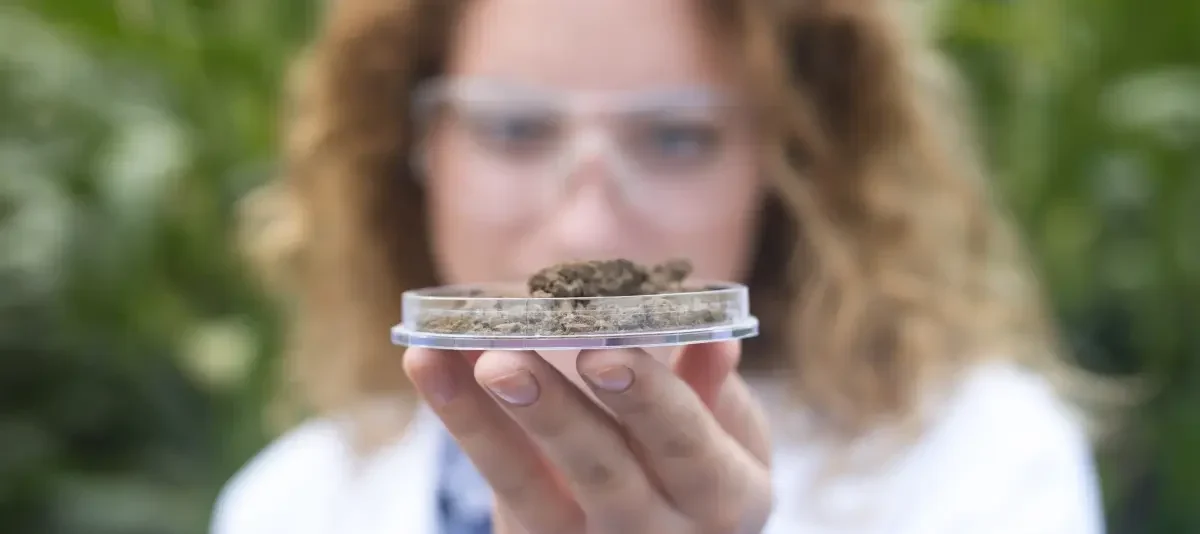We offer medical detox and multiple addiction treatment options in our
luxury treatment centres in Port Hope, Cobourg, and Ottawa.
CCFA’s Expert Guide on The Short-Term Effects of Cannabis
Marijuana is a polarizing substance with often unpredictable effects of varying lengths and intensity. While marijuana has some medicinal value, recreational use of the drug can cause numerous short and long-term effects. Its potential for abuse and dependence, as well as its harmful effects on the developing brain, make marijuana use a subject of intense debate.
Marijuana is made from the dried leaves and flowers of the cannabis plant. It contains tetrahydrocannabinol (THC), the psychoactive chemical responsible for its mind-altering properties. THC activates cannabinoid receptors in the brain to produce the effects associated with the drug. CCFA explores the short-term effects of cannabis, the dangers, and how you can alleviate them.
Key Takeaways
- Cannabis is a psychoactive plant with short and long-term health effects
- The plant has significant medicinal value, but recreational use can cause unwanted effects
- Cannabis can be smoked or consumed as an edible
- The method of ingestion can affect the duration and intensity of cannabis effects
Short-Term Effects of Weed
Marijuana (also known as weed) may be smoked, vaped, or chewed as edibles. Cannabis’ short-term effects kick in seconds after being smoked and last up to four hours. Edibles can take up to an hour before you feel anything, with the effects lasting up to 24 hours.
THC acts on brain areas that regulate pleasure, thinking, concentration, memory, coordination, and time perception. Prolonged marijuana use can lead to dependence and other physical and mental side effects. At least 30% of people who use weed will likely develop a substance use disorder.
It’s important to seek professional help if you think you or a loved one is abusing or struggling with the effects of weed. The Canadian Centre for Addiction helps people understand their addictions and healthier coping mechanisms by engaging them in one-on-one counseling with certified counselors, psychiatrists, and mental health professionals.
The short-term effects of weed when used in low doses may be different from those experienced by someone who uses high doses of the drug.
When Used in Low Doses

The short-term effects of marijuana in low doses include:
- Euphoric Effects
Recreational users take weed for its euphoric effects. THC increases the brain’s dopamine levels, eliciting a pleasurable feeling known as a “high.”
- Problems with learning and memory
Cannabis affects the hippocampus, the brain areas responsible for learning and memory. The action impairs one’s ability to learn or form short-term memories.
- Bloodshot Eyes
Cannabis relaxes and dilates the eyes' blood vessels, causing the whites of the eyes (sclera) to become red and irritated.
- Difficulty Thinking and Problem Solving
Weed’s effects on the brain can also impair executive functions, making it challenging for users to make decisions or solve problems.
- Poor Muscle Coordination
Weed interacts with cannabinoid receptors in the cerebellum and basal ganglia, brain areas responsible for posture, balance, coordination, and reaction times. Higher doses of THC negatively impact muscle coordination and fine motor skills.
- Increased Appetite
THC increases appetite by binding to receptors in the tongue and making food taste better. It enhances how your brain responds to sweet food and increases your desire for fatty foods. Cannabis can also make the brain think you’re hungry, even if you’ve recently eaten.
- Distorted Perception of Time and Space
The euphoria that comes with cannabis use may cause distorted perceptions of time and space. Users may feel more sensitive to stimuli and less inhibited. These feelings and impaired coordination from cannabis use can make driving or operating machinery dangerous.
When Used More Excessively
The short effects of cannabis in larger doses include:
Hallucinations and Delusions
Cannabis use in large amounts can lead to a disconnection from reality. Heavy users may experience unreal sensory perceptions or false beliefs that may linger after the high fades, leading to distress and inability to function.
Anxiety Attacks or Paranoia
While cannabis use is linked to feelings of relaxation, large doses can lead to anxiety and feelings of paranoia. Users may experience increased heart rate, chills, shaking, sweating, and difficulty breathing. They may also worry about dying or losing control after ingesting large amounts of marijuana.
Depression
Cannabis use is often connected to depression in some way. Individuals with depression may use marijuana to relieve their symptoms. However, using large doses of marijuana can worsen already existing depression in the short term and lower one’s motivation to seek help.
Impaired Coordination
Large quantities of marijuana can lead to short-term decreases in nerve signalling between the brain and body, leading to impaired coordination. THC can also affect the cerebellum, the part of the brain responsible for fine motor control and balance, making it difficult for intoxicated individuals to walk or stand.
What about the Long-Term Effects of Cannabis
Cannabis use can also lead to adverse long-term effects, including the following:
Dependence and Addiction
Long-term marijuana can lead to marijuana use disorder. Up to 30% of regular weed users develop dependence and addiction. The drug’s addiction potential comes from the impact of THC on the brain's cannabinoid receptors. THC molecules cross the blood-brain barrier and activate the brain rewards system. They trigger dopamine release, leading to the associated high. This dopamine surge prompts the repeat of reward-seeking behaviour, leading to potential dependence and addiction. Individuals who have become dependent or addicted to marijuana will experience withdrawal symptoms if they try to quit or reduce their use.
Issues with Teenage Brain Development
Young people who use marijuana have a higher risk of having issues related to brain development. Marijuana use in adolescence can cause irregularities in brain areas that regulate executive functions and decision-making. THC causes the loss of brain cells and interferes with the brain’s ability to build new connections between neurons. The extent to which marijuana may impair the teenage brain is still the subject of research, but young users may experience memory loss, diminished problem-solving ability, and concentration issues later in life.
Decreased Cognitive Function
THC binds to brain areas that control learning, memory, and other cognitive functions. Consequently, users can suffer long-term impairment of these functions in the short term, which may worsen in the long term with continued regular use.
Respiratory System Damage
Smoke from cannabis can irritate and inflame the lungs, leading to coughing and the development of conditions like bronchitis. Smoking cannabis can also lead to the buildup of chemicals, such as tar, in the lungs, which in turn increases the risk of cancer and other respiratory diseases.
Cardiovascular Conditions
Cannabis dilates blood vessels and causes increased heart rate, putting users at increased risk of cardiac arrest, stroke, atrial fibrillation, and related cardiovascular diseases.
Male Fertility Issues
THC has been found to lower sperm production by reducing the levels of luteinizing hormone, which is responsible for triggering sperm production. It can also damage sperm DNA, diminishing its ability to fertilize an egg. Regular cannabis use can also cause decreased libido and erectile dysfunction.
Testicular Cancer
Emerging studies suggest that men who used cannabis for longer than ten years were 50% more likely to develop testicular cancer than those who never used cannabis. Another study provided some evidence that cannabis smokers were 36% more likely to develop testicular cancer.
Substance Use Disorders
Marijuana is considered a gateway drug; this means that it provides a relatively safe psychoactive experience that makes naive users more open to experimenting with more potent substances. Most people with substance use disorders often have prior experience with marijuana. Marijuana use doesn’t always translate to abuse of other drugs, but the brain changes associated with THC increase one’s likelihood of abusing other drugs.
The Dangers of Cannabis Short-Term Effects
While many people may consider the short-term effects of cannabis use to be harmless, using cannabis can be dangerous in the short term. Impaired memory and reduced coordination can lead to accidents when driving or operating heavy machinery. Cannabis consumption influences the mood, emotions, and inhibitions of the user, making them prone to making hasty decisions, postponing deadlines, or acting recklessly.

Cannabis use can lead to increased heart rate and blood pressure, which can put people with pre-existing heart conditions at risk of cardiovascular diseases. Elevated body temperature from marijuana use can cause heat stroke and dehydration, especially if the person is working or exercising outdoors. Weed use in the short term can cause disorientation hallucinations or psychosis, which can lead to accidents.
Short-term marijuana use can have a lasting impact on the developing brain, potentially causing cognitive impairment, weed addiction, and other substance use disorders.
Are Cannabis Effects Affected by The Method of Consumption?
The method of cannabis consumption influences how quickly and intensely the effects are felt. When smoked, THC in the drug quickly enters the bloodstream via the lungs, producing immediate effects which typically last between one to three hours.
When marijuana is chewed or consumed via food or drink, less THC gets into the bloodstream than when an equivalent amount of the drug is smoked. The effects are delayed for 30 minutes to an hour as the drug must pass through the digestive tract before entering the bloodstream. This delay can make inexperienced users consume more marijuana than they should. The effects of edible marijuana may last for several hours.
Smoking marijuana is considered more dangerous than chewing it. The process of smoking produces tar and other toxins that can irritate the airways, damage the lungs, and increase the risk of diseases like lungs and chronic obstructive pulmonary disorder (COPD). Consuming cannabis edible cannabis produces fewer toxins and is considered less harmful. However, it is important to note that the short and long-term effects of cannabis can affect you no matter the method of consumption.
Tips on Alleviating The Short-Term Effects of Cannabis
The short-term effects of marijuana can be unpleasant and frightening. Here are some tips to help you alleviate these effects:
Stay Hydrated
It’s necessary to drink plenty of water to keep your body hydrated and counter the dehydrating effects of cannabis. You could also eat some snacks to balance your blood sugar levels.
Take Deep Breaths
Taking deep, slow breaths can help alleviate the feelings of anxiety you may experience due to marijuana’s short-term effects.
Find a Distraction
Dwelling on the effects of ingested marijuana can make them seem worse than they are. Try distracting yourself by reading a book, watching a movie, or talking to someone until the effects wear off.
Take a Walk
A change of environment may help alleviate the short-term effects of cannabis. A loud, busy environment can intensify the effects, so walking out for fresh air or going elsewhere that is safe may be helpful.
Seek Medical AttentionSome people experience an adverse reaction to cannabis use. It’s crucial to seek medical help immediately if you’re feeling sick or notice your symptoms are not improving. If you’re dealing with marijuana use disorder, professional intervention will help deal with the effects of weed withdrawal and equip you with better ways to cope without weed.
Conclusion
Cannabis use, despite its potential medicinal benefits, can cause unpleasant short-term effects. In most cases, the cannabis short-term effects are temporary and do not cause lasting harm. However, it’s safer to consult a professional if the effects are not getting better or you think you’re dealing with marijuana use disorder. The Canadian Centre for Addiction offers professional treatment for weed addiction, withdrawal, and related issues. Our team of addiction experts provides the help and support you or your loved one need to understand and overcome their condition. Call us today at 1-855-499-9446, and someone will speak to you about our services.
FAQ
What are the risks of early cannabis use?
Early cannabis use can lead to changes in brain development, impaired memory, and problem-solving skills. People who start using cannabis as adolescents or young adults also carry an increased risk of mental health problems and conditions like depression, anxiety, and psychosis. They are also more likely to develop marijuana use disorder and other substance use disorders.
How long does it take for cannabinoid receptors to return to normal?
Cannabinoid receptors may take several weeks to months to return to normal after a person stops abusing cannabis. The plant acts on these receptors to produce euphoria and other associated effects. Cannabis abuse changes the functions of these receptors, but they will slowly return to their normal state after the drug clears from the system.
Does medical cannabis have side effects?
Yes. Medical cannabis has side effects, including dizziness, dry mouth, diarrhea, fatigue, and appetite changes. In some cases, there may be more severe side effects like hallucinations, paranoia, and increased heart rate. It’s crucial to seek medical advice before using medical cannabis.
How long does cannabinoid syndrome last?
Cannabinoid hyperemesis syndrome (CHS) is a condition that can affect frequent users of cannabis. The symptoms include nausea, vomiting, and abdominal pain that usually goes away once the person stops using cannabis. In some cases, cannabinoid syndrome may last for weeks or months after the last cannabis use.
Can cannabis use result in aggression?
Yes. Some studies indicate that cannabis use may be linked to aggressive or violent behaviour. However, further studies are required to definitively show the connection between cannabis, aggression, and other factors like mental illness, gender, or gang involvement.
Do edibles help with nausea?
Yes. Edibles contain THC and other cannabinoids that may help relieve nausea associated with cancer, chemotherapy, or other ailments.






